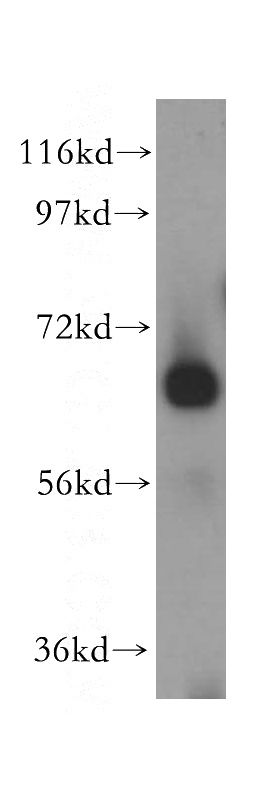-
Product Name
Bile salt-activated lipase antibody
- Documents
-
Description
Bile salt-activated lipase Rabbit Polyclonal antibody. Positive WB detected in human liver tissue, HeLa cells, mouse heart tissue, mouse liver tissue. Positive IF detected in HeLa cells. Observed molecular weight by Western-blot: 67 kDa
-
Tested applications
ELISA, WB, IF
-
Species reactivity
Human, Mouse, Rat; other species not tested.
-
Alternative names
BAL antibody; Bile salt stimulated lipase antibody; Bile salt-activated lipase antibody; BSDL antibody; BSSL antibody; Bucelipase antibody; Carboxyl ester lipase antibody; CEase antibody; CEL antibody; CELL antibody; Cholesterol esterase antibody; FAP antibody; FAPP antibody; LIPA antibody; MODY8 antibody; Pancreatic lysophospholipase antibody; Sterol esterase antibody
-
Isotype
Rabbit IgG
-
Preparation
This antibody was obtained by immunization of Bile salt-activated lipase recombinant protein (Accession Number: BC042510). Purification method: Antigen affinity purified.
-
Clonality
Polyclonal
-
Formulation
PBS with 0.02% sodium azide and 50% glycerol pH 7.3.
-
Storage instructions
Store at -20℃. DO NOT ALIQUOT
-
Applications
Recommended Dilution:
WB: 1:500-1:5000
IF: 1:10-1:100
-
Validations

human liver tissue were subjected to SDS PAGE followed by western blot with Catalog No:117145(CEL antibody) at dilution of 1:500

Immunofluorescent analysis of (-20oc Ethanol) fixed HeLa cells using Catalog No:117145(CEL Antibody) at dilution of 1:25 and Alexa Fluor 488-congugated AffiniPure Goat Anti-Rabbit IgG(H+L)
-
Background
Bile salt-activated lipase, previously named cholesterol esterase or bile salt-stimulated (or dependent) lipase, is a 74 kDa lipolytic enzyme capable of hydrolyzing cholesteryl esters, tri-, di-, and mono-acylglycerols, phospholipids, lysophospholipids, and ceramide(PMID:12454261). The same enzyme is present as a major protein in milk and as a minor constituent in liver, activated macrophages, and endothelial cells(PMID:11733511). Defects in CEL are a cause of maturity-onset diabetes of the young type 8 with exocrine dysfunction (MODY8)(PMID:16369531). The full length protein has 11 glycosylation sites. It has 2 isoforms produced by alternative splicing.
Related Products / Services
Please note: All products are "FOR RESEARCH USE ONLY AND ARE NOT INTENDED FOR DIAGNOSTIC OR THERAPEUTIC USE"
